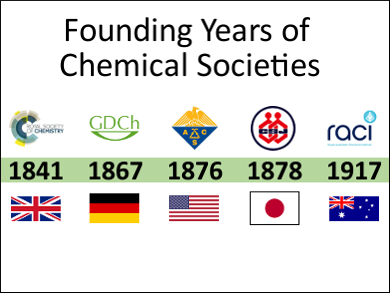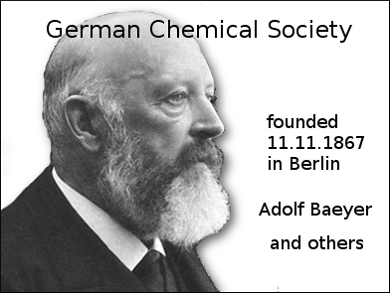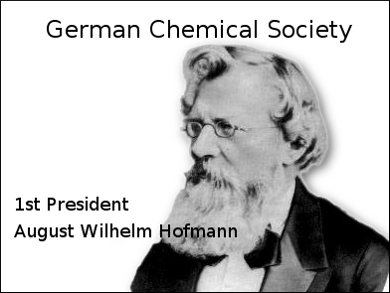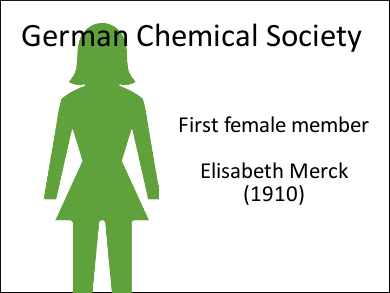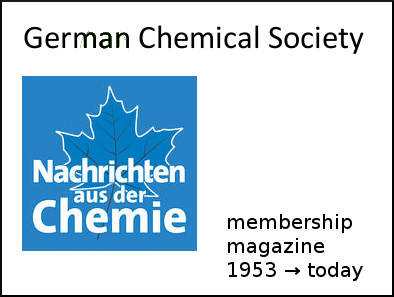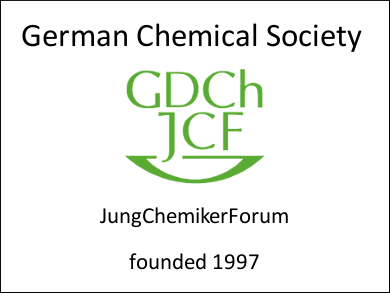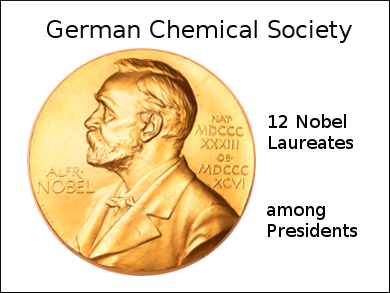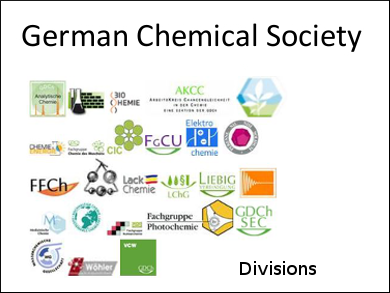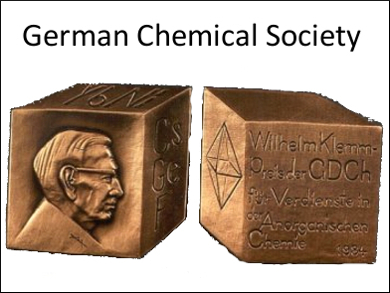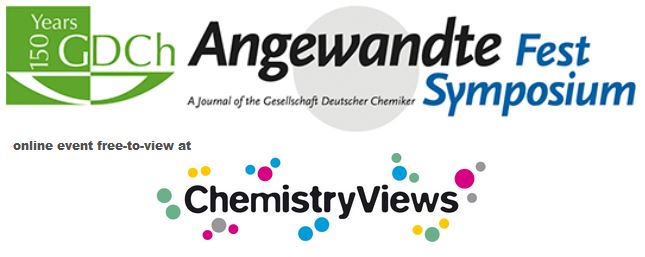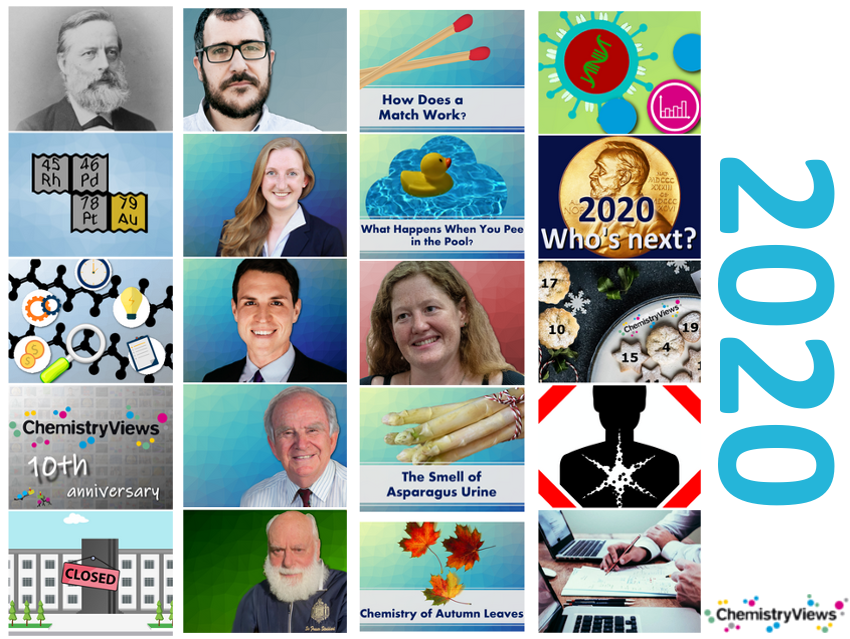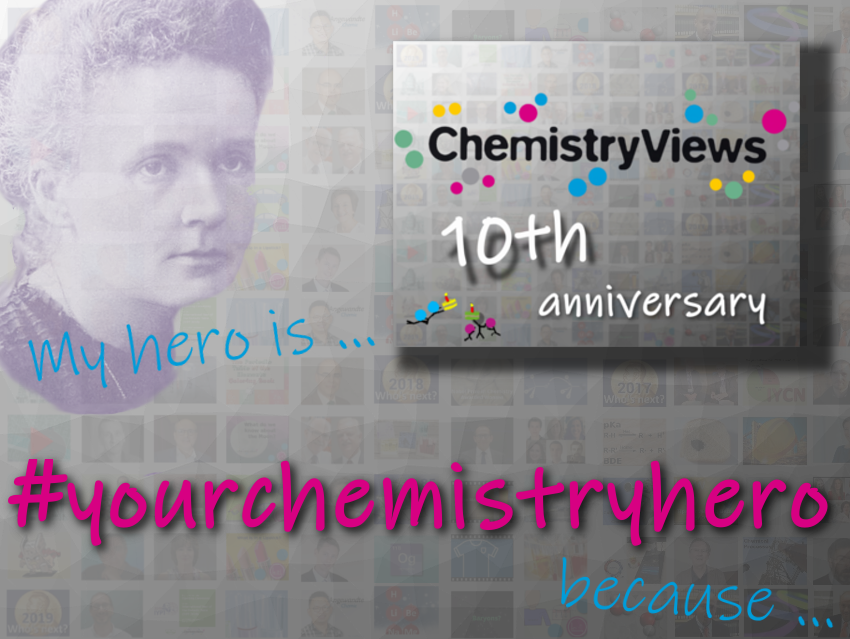Celebrating 150 Years with a Fact Each MonthJanuary · February · March · April · May · June · July · August · September · October · November · December |
|
|
The German Chemical Society (Deutsche Chemische Gesellschaft (DChG)), a precursor of the GDCh, was founded in Berlin on November 11, 1867, at a constituent meeting by Adolf Baeyer, University of Berlin, and more than 100 other chemists. The society was modeled after the British Chemical Society, the precursor of the Royal Society of Chemistry (RSC). The idea was to foster the communication of new ideas, strengthen the alliance between science and industry, and to encourage mutual exchange. [1] Die Früchte der Chemie, Nachr. Chem. 2017, 65(1), 3. https://doi.org/10.1002/nadc.20174058113 |
|
|
At the 1st General Assembly in January 1868, August Wilhelm Hofmann, University of Berlin, was elected as the first President of the German Chemical Society (Deutsche Chemische Gesellschaft (DChG)). [1] Die Früchte der Chemie, Nachr. Chem. 2017, 65(1), 3. https://doi.org/10.1002/nadc.20174058113 |
|
|
How old are the chemical societies in Australia, Germany, Japan, UK, and USA? |
|
|
The German chemical societies accepted a woman as a member for the first time in 1910. Elisabeth Merck became a member of the VDCh, a forerunner of the GDCh. She was the daughter of Emanuel A. Merck, who had been chairman of the VDCh from 1901–1906. [1] einhundertundfünfzig, Nachr. Chem. 2017, 65(1), 46–47. https://doi.org/10.1002/nadc.20174057546 |
|
|
The GDCh published their membership magazine Nachrichten aus der Chemie und Technik (News from Chemistry and Technology) for the first time in January 1953. Till 1976, it was published as a special service of Angewandte Chemie by VCH (Verlag Chemie, today Wiley-VCH). Printed on blue paper, the Nachrichten was quickly referred to as Blaue Blätter (blue sheets). Since 1977, the Nachrichten aus Chemie, Technik und Laboratorium (News from Chemistry, Technology, and Laboratory) has been published as an independent scientific monthly magazine. The editorial office was first located in Heidelberg, moved to VCH in Weinheim in 1970, and to Frankfurt to the GDCh headquarter in 1998. Since January 2000, the magazine is published with its present-day name: Nachrichten aus der Chemie. [1] Hermann G. Hauthal, 60 Jahre Blaue Blätter, Nachr. Chem. 2012. https://doi.org/10.1002/nadc.201290307 |
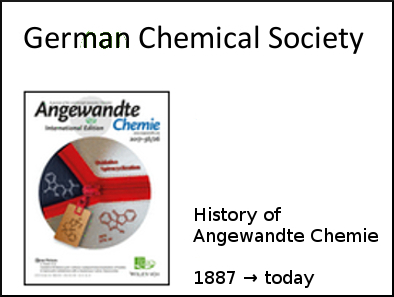 |
The Verein Deutscher Chemiker (VDCh, Association of German Chemists), a forerunner of the GDCh, founded the journal Zeitschrift für die Chemische Industrie (Journal for the Chemical Industry) for its members in 1887. In 1888, the title was changed to Zeitschrift für Angewandte Chemie (Journal of Applied Chemistry), and in 1941, it was changed to Die Chemie. Verlag Chemie (VCH) started publishing the journal in 1921. Due to World War II, the journal was not published from April 1945 to December 1946. |
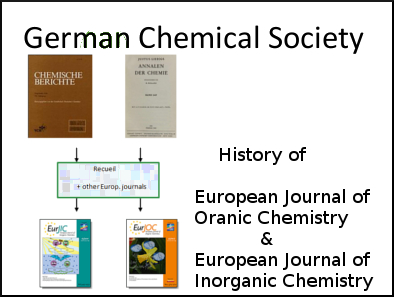 |
The journal Annalen der Chemie und Pharmazie, edited by Justus Liebig, was founded in 1832 by the German Chemical Society. In 1873, after Liebig has died, it was renamed Justus Liebigs Annalen der Chemie. The journal Chemische Berichte der Deutschen Chemischen Gesellschaft was founded in 1868 by the German Chemical Society. Among the honorary members were Liebig, Wöhler, and Bunsen. After publishing the magazine from 1919–1945 in two series (A: society news, B: essays), it appeared as a complete edition under the name Chemische Berichte from 1947 onward. Traditionally focusing on organic chemistry, after World War II, the focus was increasingly on the field of organometallic chemistry. In 1997, the GDCh and the Dutch Koninklijke Nederlandse Chemische Vereniging (KNCV) published two joint journals Chemische Berichte/Recueil and Liebigs Annalen/Recueil. In 1998, a merger took place with other European journals. This resulted in the European Journal of Inorganic Chemistry and European Journal of Organic Chemistry published by the ChemPubSoc Europe societies. [1] The Future Builds on the Past, ChemViews Mag. 2010. https://doi.org/10.1002/chemv.201000010 |
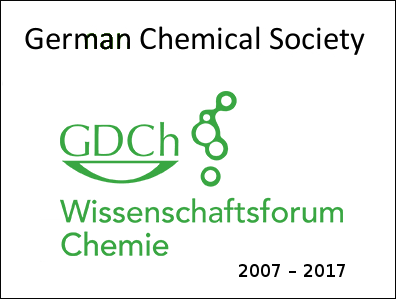 |
The WiFo (Wissenschaftsforum/Science Forum) is the largest and most important scientific event of the GDCh. It takes place every two years at varying locations in Germany and covers the entire range of chemistry. In addition to the scientific program, there is a large company exhibition, a job fair, and a supporting program that is open to the general public. The first WiFo was held in Ulm in 2007 and emerged from the so-called Annual General Meeting (Hauptversammlung). Other venues were Frankfurt (2009), Bremen (2011), Darmstadt (2013), and Dresden (2015). This year’s WiFo will be held in Berlin and will involve many special events to celebrate the 150th anniversary of the GDCh. [1] Event: GDCh-Wissenschaftsforum Chemie 2017 (WiFo 2017) |
|
|
Twenty years ago, in 1997, the JungChemikerForum (JCF; Young Chemists’ Forum) of the GDCh was founded. With more than 10,000 members, they represent about one third of the members of the society. The Regionalforen (regional forums) of the JCF make the GDCh enjoyable for young chemists at almost all German universities. Regular JCF meetings build bridges between students, industry, and science and the JCF organizes numerous events, such as Sherlock Holmes & Chemistry. [1] Sebastian Beil, Jung geworden, Nachr. Chem. 2017, 64(4), 499. https://doi.org/10.1002/nadc.20174062788 |
|
|
Eleven presidents of the German chemical societies received the Nobel Prize in Chemistry and one in Physiology or Medicine: Feodor Lynen (Nobel Prize in Physiology or Medicine in 1964, President 1972–1973) Karl Ziegler (Nobel Prize in Chemistry in 1963, President 1898–1973) Adolf Bayer (Nobel Prize in Chemistry in 1905, President 1871, 1881, 1893, 1903) Eduard Buchner (Nobel Prize in Chemistry in 1907, President 1904) Emil Fischer (Nobel Prize in Chemistry in 1902, President 1894, 1895, 1902, 1906) Fritz Haber (Nobel Prize in Chemistry in 1918, President 1922–1924) Jacobus Hendricus Van’t Hoff (Nobel Prize in Chemistry in 1901, President 1901, 1905) Richard Kuhn (Nobel Prize in Chemistry in 1938, President 1938–1945, 1964–1965) Hermann Walther Nernst (Nobel Prize in Chemistry in 1920, President 1908) Otto Wallach (Nobel Prize in Chemistry in 1910, President 1910) Heinrich Otto Wieland (Nobel Prize in Chemistry in 1927, President 1928–1930) Richard Martin Willstätter (Nobel Prize in Chemistry in 1916, President 1924–1926) [1] einhundertundfünfzig, Nachr. Chem. 2017, 65(1), 46–47. https://doi.org/DOI: 10.1002/nadc.20174057546 |
|
|
The GDCh has 28 divisions which represent specialist areas (such as photochemistry and medicinal chemistry) as well as certain interest groups (such as freelance chemists and senior experts). The divisions of food chemistry, analytical chemistry, chemoinformatics, and organic chemistry (Liebig Division of Organic Chemistry) are the largest divisions of the GDCh. Founded in 1947, the division of food chemistry and the division of paint and varnish chemistry are the oldest divisions of the GDCh; the youngest is the division of chemistry and energy. It was founded in 2015. More on the GDCh divisions |
|
|
Every year the GDCh presents its prestigious awards to outstanding national and international chemists in a wide range of fields. The highest honor is the GDCh honorary membership. This honor was introduced in 1949, presented for the first time in 1952, and since then has been awarded more than forty times. The oldest awards are the August-Wilhelm-von-Hofmann-Denkmünze and the Liebig-Denkmünze. First awarded in 1903, they remain a very special recognition. More on the GDCh awards: www.gdch.de/gdch/preise-und-auszeichnungen.html |
-
September 10: Celebration in Berlin starts with a ceremony in the Konzerthaus Berlin, a concert hall situated on the Gendarmenmarkt square. Nobel Laureate Roald Hoffmann will speak there among others.
-
September 11: Angewandte Festsymposium (confirmed speakers include Nobel Laureates: Ben Feringa, Robert Grubbs, W. E. Moerner, Jack Szostak; will also be streamed live by ChemistryViews.org. Registration to view the lectures online is free and will open soon), Henry Ford Building of the Free University of Berlin
Register for free to follow this event online. -
September 11: Chemistry Slam, Henry Ford Building of the Free University of Berlin.
-
September 12 and 13: WiFo 2017 (Wissenschaftsforum/Science Forum), the largest biannual event of the GDCh. This year, it will take place under the motto “Chemistry Moves” (Chemie bewegt).
-
September 14: Symposium Experiment Future – Value Thinking in Chemistry (Experiment Zukunft – Wertedenken in der Chemie) will discuss the contribution that chemistry must make for the future of mankind.
